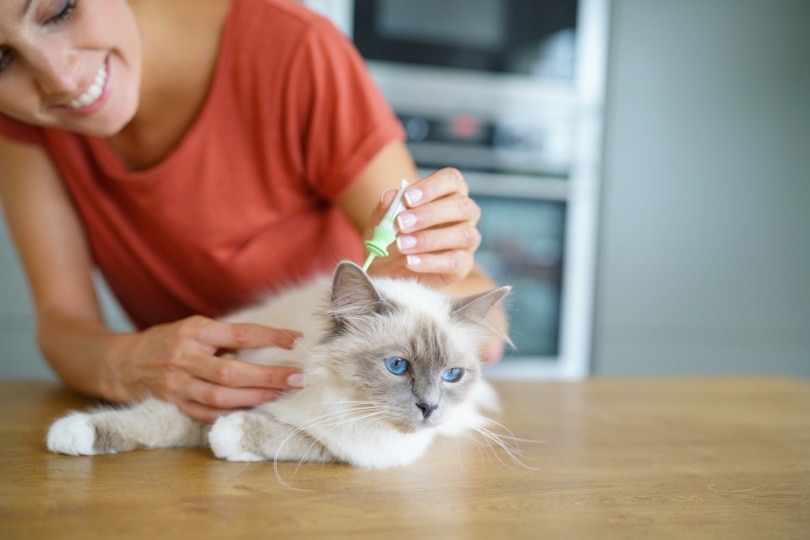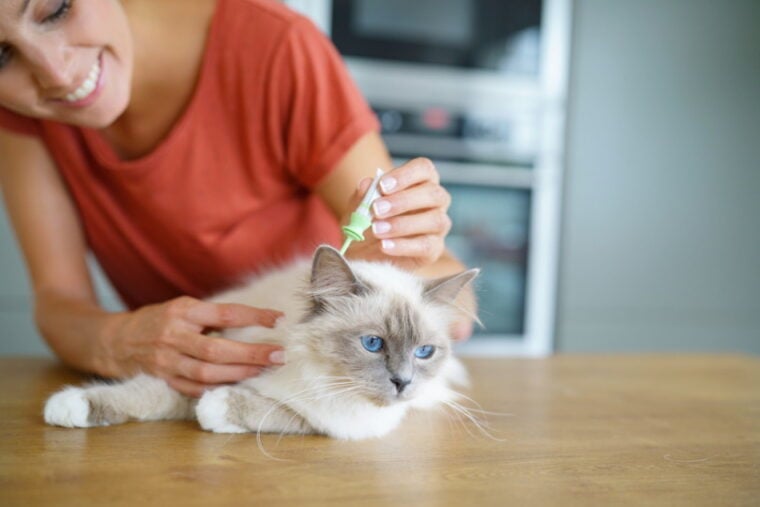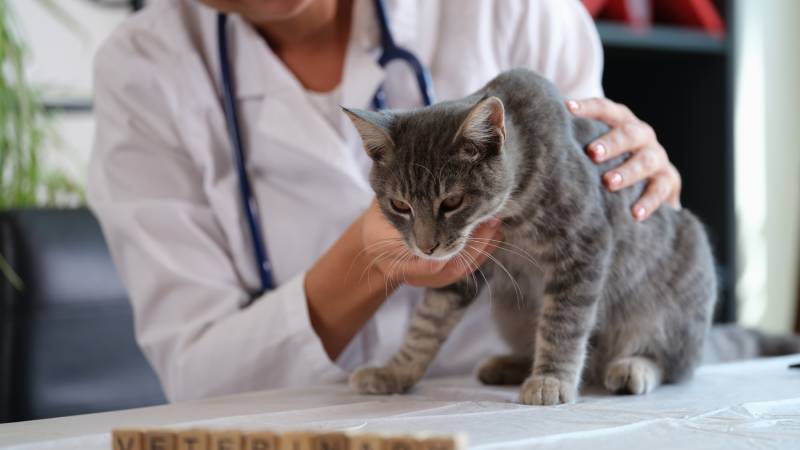- March 16, 2024
How Long Does Flea Medicine Take to Dry? Vet Reviewed Info and Facts



The information is current and up-to-date in accordance with the latest veterinarian research.
Applying spot on flea preventatives is a standard monthly procedure for cat and dog parents, and it’s usually as simple as squeezing the medicine onto the back of your pet’s neck. That said, it can take a while to dry, and the drying time can vary from animal to animal.
As a rule, flea treatment medicine typically dries within a few hours, and it’s best not to touch the area of application until it has thoroughly dried. Read on to find out why.

When Can I Touch My Pet After Applying Flea Preventatives?
Depending on the type of coat your pet has, it could take from one to several hours for the flea treatment to dry. If in doubt, wait until you’re sure the area is completely dry to avoid interfering with the absorption process or getting the product on your skin. If this happens, wash your hands thoroughly and take care not to touch your mouth or eyes.
In addition, the PDSA recommends not bathing or grooming your pet or letting them swim for at least 24 hours after application, and this is also the timeframe given by the Blue Cross. On that basis, at least 24 hours is a good amount of time to wait before touching the area again if you can’t tell if it’s dry or not.
The best thing to do is refer to the direction leaflet provided by the flea treatment brand you’re using to find out when it would be appropriate to touch the area again. If you have any doubts, please contact a vet for advice.

Can My Pet Play with Other Pets While the Treatment Is Drying?
No, this is not a good idea. Avoid letting children or other pets play or cuddle with the pet undergoing treatment while the back of the neck is drying. Again, at least 24 hours is a good timeline to go by for making sure the product is fully dried and absorbed, but this may vary by product, so check the directions.
If another pet licks the treatment, it could cause toxicity—especially if a cat licks flea treatment off a dog. Similarly, you should never apply flea treatments formulated for dogs on cats. For reference, signs of flea treatment poisoning or reactions can include:
- Vomiting
- Diarrhea
- Incoordination
- Appetite loss
- Severe depression
- Drooling
- Foaming at the mouth
- Trembling
- Seizures
- Lethargy
- Ear twitching
- Hiding
- Itchiness
- Agitation
If one of your pets is showing signs of flea medicine toxicity, please see a vet immediately.

Tips for Using Flea Medicines
When used as directed, flea and tick treatments are typically safe and very effective. Adverse effects are uncommon. Nevertheless, there are some safety tips to keep in mind. Here are some tips for applying flea treatments:
Do
- Always refer to the directions inside the packet for how and where to apply the treatment.
- Wear gloves when applying the treatment.
- Only use the amount of product indicated in the directions.
- Wash your hands after application.
- Take off your pet’s collar when you apply the treatment.
- Keep animals away from one another while the application dries.
- Check the minimum age for use (some products may not be suitable for puppies, kittens, or pregnant animals).
- Make sure the product is suitable for your pet’s weight.
- Speak to your vet if you have any questions or concerns.
- Wash the product off with dishwashing soap and lukewarm water and call your vet immediately if your pet starts developing weird symptoms after application.

Final Thoughts
To recap, flea medicine can dry within an hour or two in some cases, but it can take a lot longer. If in doubt, avoid touching or grooming the area until you are sure, and don’t bathe your pet for at least 24 hours or however long the directions stipulate.
Featured Image Credit: goodluz, Shutterstock
Tags
What do you think?
Related Articles

New Puppy Checklist: Gear You’ll Need for Your New Dog
Getting a new puppy is really exciting, but before you welcome them home, it’s important to prepare your space for them. Since puppies need a

How Big Do Mini Poodles Get? Vet Reviewed Average Weight & Growth Chart – Dogster
The information is current and up-to-date in accordance with the latest veterinarian research. Learn more » When you buy a Miniature Poodle, you might not

Can Police Dogs Smell Nicotine? Vet Verified Facts & Info – Dogster
The information is current and up-to-date in accordance with the latest veterinarian research. Learn more » While cigarette sales have been declining steadily for decades,

How Old Is 5 in Dog Years? Vet-Approved Guide to Each Size of Dog – Dogster
The information is current and up-to-date in accordance with the latest veterinarian research. Learn more » A common method for calculating a dog’s age is

